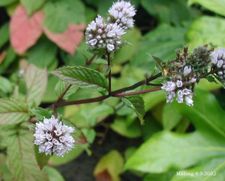
This herb is excellent for any digestive disorders as the menthol in it stimulates the digestive juices.
Sip a cup of this aromatic tea made with 1/4 cup of fresh leaves to a cup of boiling water, cover and allow to stand for 10 minutes. This tea is good in cases of flatulence, colitis, indigestion and diarrhoea. Also good for nausea, it acts as a mild anaesthetic on the stomach wall, helping with the queasy feeling.
Mint is also an effective anti-spasmodic for period pains, irritable bowel syndrome and stomach cramps.
You may also try a combination of almond oil with 2 drops of peppermint oil and rub over your stomach in circular motion. This is also good for painful joints.
To relieve nasal, chest and sinus congestion, try peppermint oil as an inhalant. Place a drop of the oil at the base of your nose or on your upper lip to clear a stuffy nose. Alternatively, put a few drops into a basin of hot water , stand over it, covering your head with a towel in a tent fashion and inhale the menthol vapour. For stubborn coughs, rub a drop of peppermint oil directly onto your throat.
When suffering from cold sores, dab a drop of the oil on the affected area and the antiviral effect should clear it up in no time.
For headaches and migraines, rub a drop of peppermint oil on each temple if the headache is at the front of the head and at the base of the skull if the headache is at the back of the neck.
This oil can also be used as a pain reliever for toothaches. Mix a bit of the oil with olive oil, rub a piece of cotton wool in it and hold it next to the aching tooth.
Add a few drops of peppermint oil to your bath water for a circulation boost.